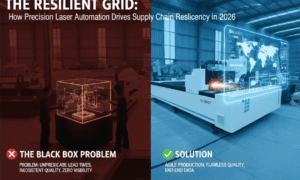The seamless operation of supply chains and logistics is crucial in today’s dynamic global economy. As the logistics and supply chain market is expected to surge from USD 32 billion in 2019 to USD 75 billion by 2030, it becomes evident that innovation is necessary to meet the growing demands. Rohit Khankhoje, a pioneer in quality assurance (QA) practices, has been at the forefront of revolutionizing the industry through his work in building QA automation teams.
In recent years, e-commerce has experienced explosive growth, driven by the digital revolution and the increasing demand for faster deliveries. This transformation, known as Logistics 4.0, has reshaped supply chain management. However, the COVID-19 pandemic further highlighted the need for resilience and agility in logistics and supply chain operations. This is where test automation plays a critical role.
Test automation allows companies to align their systems with market demands and regulatory changes efficiently. By automating the testing process, businesses can save time and costs associated with manual testing while improving accuracy and efficiency. In an industry where flawless operations are essential for customer satisfaction and business continuity, test automation has become a strategic component for the development of logistics and supply chain management.
Despite the inevitable digital transformation in logistics, there is still a significant gap in the industry’s digitization. According to a recent PwC study, only 28% of logistics and transportation companies consider themselves advanced in digitization. This lack of digital culture and training is a concern, considering the rapid pace of technological advancement.
As logistics and supply chain systems become more complex and integrated with technologies like IoT, AI, cloud, and 5G, the need for robust testing methodologies becomes evident. Automation testing ensures the proper functioning, efficiency, and security of these sophisticated systems. It verifies real-time data transmission, AI algorithms’ performance, and the seamless integration of digital components. Without effective automation testing, the risks and errors in these advanced systems could lead to significant operational disruptions, undermining the benefits of digital transformation.
Rohit Khankhoje recognized the potential of automation in addressing the challenges faced by logistics and supply chain operations. As part of his role at Protrans Inc., a leading logistics company, he embarked on building a geographically diverse QA automation team. This team spread across the USA, India, and Mexico, focused on developing an adaptable system to meet the dynamic demands of supply chains while ensuring consistent, high-quality outcomes.
Rohit’s approach involved a thorough analysis of existing quality issues in logistics and supply chain operations. He identified a significant gap in professionals skilled in automation testing for logistics and supply chain software. To bridge this gap, he nurtured a culture of continuous learning and adaptability within his team, essential for staying updated with emerging technologies.
Under Rohit’s guidance, the team created a custom automation framework. This framework was designed to be intuitive, allowing even those with limited technical knowledge to utilize it effectively. This inclusivity enabled team members with a strong business acumen to contribute to writing automated tests, enhancing their understanding of the logistics domain.
The innovative approach to automation not only accelerated the QA process but also deepened the team’s understanding of logistics systems. Rohit’s strategy reduced costs associated with manual testing and accelerated the feedback loop, improving Protrans Inc’s market strategies’ efficiency.
Inspired by Rohit’s vision, the team developed sophisticated automated systems that simulated complex supply chain scenarios, identified bottlenecks, and proactively detected potential errors. The bespoke framework developed under Rohit’s leadership transformed logistics quality assurance. His insights and methodologies were further detailed in his published paper, “An In-Depth Review of Test Automation Frameworks: Types and Trade-offs,” where he discussed unique design patterns and the nuances involved in choosing the right framework for specific scenarios.
The impact of Rohit’s innovations was profound. The automation systems developed by his team increased the accuracy of Protrans Inc’s logistics operations, ensuring timely deliveries and customer satisfaction. These systems also provided valuable insights into supply chain processes, enabling better decision-making and strategic planning. Additionally, the proactive approach significantly reduced costs associated with manual testing and error rectification.
Rohit’s contributions prepared the logistics sector to adapt to change and uncertainty. When the COVID-19 pandemic disrupted supply chains globally, the agility of the automated QA systems helped companies quickly re-strategize and adapt to the new normal.
In conclusion, Rohit Khankhoje’s journey in building QA automation teams has revolutionized logistics and supply chain testing. His innovative approach, coupled with a deep understanding of business needs, has transformed traditional QA practices. Through his work, Rohit has paved the way for a digitally advanced landscape in logistics, ensuring efficiency, accuracy, and resilience in supply chain operations.



































